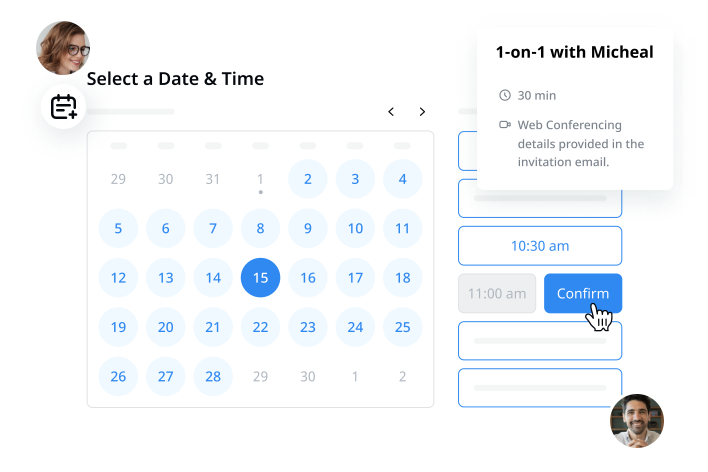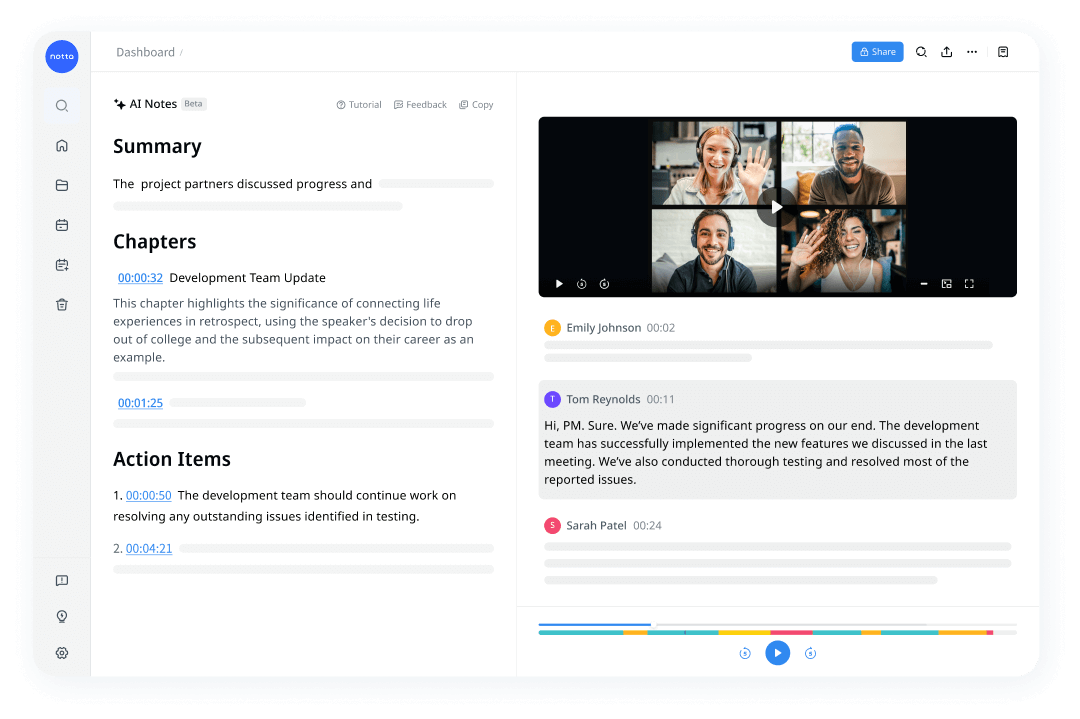Picture this: You open up your laptop on a fresh day of work and check your calendar, and lo and behold, your day is packed with meetings! You even find two meetings overlapping, and you’re wondering what to do. Chances are you’ll have to prioritize one over the other.
I’ve found myself in this situation far too many times, so I know how challenging it can be to have to decline a meeting invite. But does it really have to be?
In this guide, I’ll show you how to decline a meeting professionally. I’ll also take you through a few valid reasons why one might have to decline a meeting and give you a few examples of how you can do so.
Valid reasons to decline a meeting invite
There could be several reasons why you might have to decline a meeting. And given how busy one’s work day can be, it can often be easy to let your frustration show. However, doing so in a polite and professional way can help you maintain a healthy working relationship with your peers or superiors.
Some valid reasons to decline a meeting include:
Scheduling conflicts: If you face a scheduling conflict in which one meeting needs to be given higher priority, you can go ahead and decline the other.
Lack of relevance: If a meeting doesn’t really require your presence, perhaps because it’s irrelevant to your role or you may not have anything of value to contribute, it’s perfectly appropriate for you to decline an invite.
Insufficient notice: Sometimes, we get roped into meetings on short notice, especially when you already have other high-priority tasks to work on. In such cases, you can politely decline an invitation and offer to reschedule.
Outside working hours: Unless previously decided, you can politely decline a meeting invite if it’s been scheduled outside your work hours.
How to decline a meeting invite
Having discussed the various reasons why you might want or need to decline a meeting, the next biggest question in your mind is probably, 'How should I actually do it?' In this section, I’ll take you through the key steps that can help you go about this professionally.
Step 1: Determine your reason for not attending the meeting
The first step is to carefully review the details of the meeting — its purpose, agenda, the list of people attending, and when it’s scheduled. This is crucial, as you don’t want to jump to conclusions without having read through the details.
At this stage, if you find that the meeting conflicts with one you agreed to previously or you simply don’t need to be a part of it, you can go ahead and decline the invite, providing your reason for it. Reviewing the details also gives you the benefit of asking the organizer for any clarification you might require.
Step 2: Propose to reschedule the meeting at a suitable time
If the reason behind declining the invite is because of a scheduling conflict, you can propose an alternative time that suits you well. You can easily check your organizer’s calendar along with the calendars of the other attendees to see which time might suit them well.
On the other hand, if the meeting doesn’t require your participation whatsoever, you can reach out to the organizer with your reason and work it out professionally. Doing so via email or Slack is the way to go!

Say goodbye to meeting conflicts
Notta’s AI meeting scheduler ensures that you’re never double-booked by effectively managing your scheduled events.
Step 3: Be open to other options
Just like a writer is always told to approach their problems with a 'yes, and?' approach, the best way to deal with declining a meeting is to adopt the 'no, but' approach. Take a situation where you believe that a meeting won’t benefit from your presence, but the organizer wants to loop you in regardless because they believe your participation to be crucial.
With a 'no, but' approach, you can open the door to open communication and figure out a solution that works for both parties alike.
Step 4: Be clear yet polite in your response
Lastly, when declining a meeting, using the right tone is key. Your response must always be clear yet courteous and polite. Clearly state why you won’t be able to attend, and politely offer to reschedule or find other solutions to collaborate.
This is essential, as written communication is devoid of any non-verbal cues, and the last thing you want is for the organizer to perceive your response negatively for any reason.
Email examples of declining meetings
If you’re a freshly minted employee who’s faced with the prospect of declining a meeting for the very first time or simply would like some direction on how you can do so professionally, I’ve got you covered. In this section, I’ll take you through three examples of how to decline meeting invites for different reasons.
Decline a meeting due to another meeting
Hi [meeting organizer’s name],
Thank you for the invite for the _____ to discuss the ______. Unfortunately, due to a high-priority meeting scheduled for the same time, I’ll have to decline your invitation. However, I’d like to reschedule the meeting for a time that suits everyone’s calendar.
I see that you’re free on ____ between and . Would that be a suitable time for you?
Thanks,
[Your name]
Decline a meeting request and suggest an alternative option
Hi [meeting organizer’s name],
I hope this email finds you well. I’m writing to let you know that I won’t be able to attend the meeting scheduled for ___ at ___ as I have certain high-priority tasks to deliver at the time.
Instead of a meeting, would you be open to discussing the subject of the meeting over email? This will help me stay on track with my other tasks and collaborate with you simultaneously.
Do let me know if this works for you, and we can set up a thread to get the ball rolling.
Thanks,
[Your name]
Decline a meeting and send someone in your place
Hi [meeting organizer’s name],
I hope you’re doing well. This is regarding the meeting scheduled for ___ at ____ to discuss [topic]. Unfortunately, I won’t be able to attend the meeting at the proposed time.
However, I’d propose sending [team member’s name] in my place to ensure the meeting stays on track. I’ll get in touch with them to get a closer look at the discussion and the meeting’s notes.
Please let me know if that works for you, and I’ll get you in touch with [team member’s name.]
Thanks,
[Your name]
How to attend a meeting once it comes along
If you’ve been invited to a meeting that suits your schedule well and is relevant to your role, the natural thing to do is attend it at the scheduled time. However, when attending a meeting, there are several things you must ensure to keep the meeting productive and that it meets its intended outcomes.
The first step is to ensure the meeting is recorded from start to finish. Then, you must transcribe the meeting into written text. Lastly, you’ll have to summarize the text so everyone can extract their respective action items.
And if you can’t attend a meeting yourself, you can send the Notta bot on your behalf. It automatically transcribes meetings for you to refer to in the future and can seamlessly integrate with other software in your tech stack, including Zoom, Google Meet, Microsoft Teams, and Webex.

It transcribes meetings with 98.86% accuracy and can even summarize them for you to share on the go, streamlining your meetings from the word go.
Efficient, productive meetings with Notta
Let Notta worry about the details so that you can focus on the meeting. Accurate, real-time meeting notes at your fingertips.
Key takeaways
Workplaces can be extremely demanding, and with an increasing part of the global workforce operating remotely, the blurring of the lines between one’s work hours and time off is visible to us all. Meetings constitute a crucial part of how organizations run, but we aren’t always in a position to be able to attend them.
However, this isn’t a cause for concern, as clear, direct, and polite communication will always come to your rescue. In this guide, I’ve taken you through some of the valid reasons to decline a meeting, along with a step-by-step guide on how you can go about this.
When you do attend a meeting, it’s essential that you record the discussion from start to finish and transcribe it so every member has a clear idea of their action items. Notta, an AI-powered meeting assistant, can be your best friend here, allowing you to accurately record, transcribe, translate, and even summarize meetings.
FAQs
When should you decline a meeting?
If you have prior engagements when a meeting is scheduled, face a scheduling conflict, or believe your presence may not be of value, you can politely decline a meeting and offer to reschedule or send someone in your place.
Is it necessary to provide a detailed explanation when declining a meeting invite?
While you don’t have to offer a detailed explanation of why you can’t attend a meeting, it’s always polite to briefly explain your reasons. If you need to attend a meeting but can’t do so at the scheduled time, you can speak to the organizer about rescheduling it for a suitable time.
What happens if you fail to decline meeting invites professionally?
Not declining meeting invites professionally can affect your professional relationships or even portray a casual approach to your responsibilities. As a result, it’s crucial that you briefly explain why you can’t make it and offer alternative solutions to ensure the meeting’s purpose is met.


